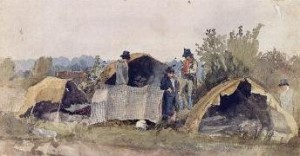 The Kariv language is just as interesting, colorful, and varied as the people who use it. This is just an example of the words they use to help you lend flavor to your speech and to bring your characters to life.
The Kariv language is just as interesting, colorful, and varied as the people who use it. This is just an example of the words they use to help you lend flavor to your speech and to bring your characters to life.
The basic units of Kariv society are the familia (fa-MEEL-yah), or family; vitsa (VEET-sah, vitsi (pl.)), or clan; and kumpania (koom-pa-NEE-yah), or tribe; several kumpanii together compose the Natsia (nat-SEE-ah), or Nation…
Familia
- Aunt: bibio (BEE-bee-oh).
- Brother: prala (PRAH-lah).
- Brother-in-Law: zhamutro (zha-moo-TRO). Literally, “groom.”
- “Co-parent-in-law”: xanamiki (kha-na-MEE-kee). Term for fellow mothers and fathers-in-law.
- Cousin (both genders): simensa (see-MEN-suh).
- Daughter: chikni (CHEEK-nee).
- Daughter-in-Law: bori (BORE-ee). Literally, “bride.”
- Father: dadro (DAH-dro).
- Granddaughter: chaveske chikni (chav-ESS-kay cheek-NEE).
- Grandfather: purodad (POOR-uh-dod).
- Grandmother: puridaia (poor-ee-DIE-uh).
- Grandson: chaveske chikno (chav-ESS-kay cheek-NO).
- Husband: kar.
- Mother: dai (DIE).
- Nephew: palesko (pal-ESS-ko).
- Niece: penyaki (pen-YAWK-ee).
- Sister: phei (FAY).
- Sister-in-Law: bori (BORE-ee).
- Son: chikno (CHEEK-no).
- Son-in-law: zhamutro (zha-moo-TRO).
- Uncle: kako (KAH-koh). It is also a respectful form of address for any older man.
- Wife: monisha (ma-NEE-sha). Also, more loosely, girlfriend.
People
- Baba: a term of respect for an old woman, used before her name: eg. Baba Ravena.
- Baro moy: “big mouth,” a gossip.
- Bor: friend.
- Chavi (CHA-vee): a Karivni girl.
- Chavo (CHA-vo): a Kariv boy.
- Chivani (chee-VAWN-ee): the head phuri dae (wise woman) of a kumpania, eg. Baba Ravena.
- Choro (CHORE-oh): a thief.
- Dilo (DEE-lo): a fool or imbecile (a favorite word for the Gaje!)
- Drabarni (dra-BAR-nee): a female Karivni herbalist and fortuneteller.
- Glata (GLAH-ta): children.
- Joovi (JOO-vee): woman (in general).
- Kralisi (kra-LEESE-ee): queen; used for both Kariv (unofficial name for a Rom Baro’s wife, unless she is the Phuri Dae) and Gaje queens.
- Lubni (LOOB-nee): a tart or wench.
- Moosh: man (in general).
- Phuri Dae: wise woman.
- Phuro (FOO-roh) (fem. phuri, pl. phuri): a wise and respected elder, used before his or her name.
- Puyuria (poo-YOUR-ee-ah): wannabe Gypsies.
- Rai: “sir,” a term of great respect usually reserved for great rulers and phuri.
- Kar: a married Kariv man (unmarried men are called karoro, or “not quite a man”).
- Karivni (KAR-ivnee): a married Romani woman (unmarried women are still called chavi).
- Shanglo (SHAN-glow): “the Law,” any Gaje law officer.
- Ves’tacha (VESS TAH-cha): “beloved.”
Opposites
- Adoi (ah-DOY): there; akai (ah-KIE): here.
- Baro (BAH-ro): big; bitti (BEET-ee): small.
- Latcho (LAH-cho): good; narkri (nar-KREE): bad.
Things & Places
- Bujo (BOO-zho): literally, “cloth over the eyes”; an elaborate swindle to gain money from a Gaje (non-Kariv). Often combined with dukkerin (fortune telling).
- Chakano (cha-KAH-no) (pl. chere (CHAIR-ay)): star.
- Churi (CHOOR-ee): knife.
- Dijilia (dee-JEEL-ee-ah) (sing. dijili (dee-JEEL-ee)): songs.
- Diklo (DEEK-loh): the headscarf worn by karivni and sometimes kar.
- Drom: road.
- Foros (FOR-oss): fair/market.
- Galbe (GALL-bay): the gold coin necklace, a traditional part of Kariv garb. Also, dowry.
- Habben (HOBB-en): food.
- Kishti (KISH-tee): belt/sash.
- Lavuta (la-VOO-at): fiddle.
- Love (LOW-ay): money.
- Mulo (MOO-lo) (sing. mule (moo-LAY)): ghosts; Kariv almost never travel at noon or at night for fear of ghosts, who possess the living.
- Patrin (PAT-treen): Kariv trail signs, used to inform other Kariv about an area.
- Sumadji (soo-MOD-jee): family heirlooms, the only items not burned with a Kariv’s body and his/her vardo after death.
Miscellaneous
- Amria (am-REE-ah): a curse/oath.
- Chor: to steal; coribe (cha-REE-bay)-thievery.
- Dhon: very much.
- Didlo (DEED-loh): crazy.
- Dinili (dee-NEEL-ee): silly, stupid, foolish.
- Divano (dee-VAWN-oh): a meeting, important gathering.
- Dook: the sight; dukker: tell fortunes.
- Dosta (DOST-ah): enough.
- Gras: horse.
- Lolo: red.
- Patshiv (PAT-sheeve): celebration.
- Rinkini (rin-KEE-nee): beautiful.
- Kariv (ka-riv): Gypsy.
- Karivniya (ka-riv-NEE-yah): Kariv laws/traditions.
- Tarno (TAR-no): young.
- Tatcho (TATCH-oh): real/true; often a question.
- Basht (or baxt, bak): “good luck.”
- Gaje (GAH-zhe) (sing. masc. gajo, sing. fem. gaji): all non-Kariv.
- Mahrime (MAH-ree-may) (also mokadi (mo-KAH-dee)): “spiritually unclean and impure.”
- Phral (FROLL): literally, “brother”; in some dialects full-blooded Gypsy, True Kariv, a high honor. Adjective/noun.
- Prikaza (pree-KOZ-ah): “bad luck.”
- Kariv Baro (ROM BAH-ro) (also Bulibasha (boo-lee-BOSH-ah)): literally, “big man,” the Kariv Baro is the leader of a vitsa (clan) or kumpania (tribe, made of several clans).
- Vardo (VAHR-doe) (or vurdon): the brightly painted and elaborately carved wagons around which Kariv life traditionally centers, serving as both transportation and home. Pulled by one or two horses depending on size.
- Wuzho (WOO-zhoh): “pure and untainted,” certain creatures are revered as wuzho, including hedgehogs, horses, and scavengers (who are honored for recycling the dead), and some people, including most Kariv.

Pretty neat bit of flavor!
Nice job Bran!
Very interesting.
Some points:
There are a few instances where you forgot to replace roma with kariv (Rom Baro, ROM BAH-ro, a married Romani woman).
The Miscellaneous section is not sorted.
Also: What’s the name for a Kariv Queen, who is not queen because of her husband? Per the brainstorm the Kariv seem not as patriarchic as the Roma. At least i wouldn’t say the Twin Queens for example would count as a phuri dae
Yep, definitely some misses there with the Roma.
The Kariv Queens who are queens on their own are usually just “Mother”, as in “Mother Rye” or “Mother Mountain”.
Nice Catch. And I went over that a few times to change the Rom and correct things.
Kariv Baro
Karivni (KAR-ivnee): a married Kariv woman (unmarried women are still called chavi).
Kralisi (kra-LEESE-ee) — Queen.